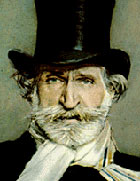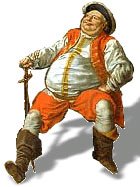2005 Spring Festival - Masquerade – the Euphonium ‘Everest’
5-May-2005The euphonium players of the 21 bands in the Grand Shield will be having a few sleepless nights ahead of 'Masquerade' this weekend, as they tackle on of the hardest euphonium cadenzas ever written. Mark Bousie investigates.
In recent years the powers that be and composers writing for brass band seem to have made something of a habit of being rather unkind to the euphonium playing fraternity. Gone are the days where the instrument played a very definite supporting (all be it a very important one) role to the principal cornet. Okay, there were some very fine exceptions to this rule, 'Le Roi Y's' and, 'Carnival Romain' and 'Festival Music' being great examples, but in general the euphonium was the bridesmaid compared to its higher pitch compatriot.
However, over the last twenty years or so the writing for the instrument in major test pieces has literally soared. For those of you who've spent hours struggling over these often epic like solo passages, playing notes you never knew previously existed, you can blame the likes of virtuosos Steven Mead, Bob and Nick Childs and more recently David Childs and David Thornton for demonstrating to composers just how far you can stretch the euphonium, particularly in terms of extremes of register.
In terms of the modern repertoire Philip Sparke was probably the first to raise the bar when his 'Harmony Music' (1987) had the leading players of the day reaching up for a high E and plummeting to the depths of a low D in its challenging cadenza, It still tests the best to this day.
Nothing, however, was to prepare the top euphonium players of the early 1990's for the summer of 1993 when the part to Philip Wilby's 'Masquerade' landed on their stand.
 Its hard to believe that Wilby's work based on Verdi's comic opera 'Falstaff ' is now twelve years old, but it is testimony to its difficulty that it is still generally regarded as the most challenging test piece in the repertoire for euphonium (and perhaps for the whole band). Put simply, it is the Everest of solos for the instrument. 'Masquerade' will be a massive test for all the bands in the Grand Shield in Blackpool on Saturday for sure – and for the euphonium players in particular.
Its hard to believe that Wilby's work based on Verdi's comic opera 'Falstaff ' is now twelve years old, but it is testimony to its difficulty that it is still generally regarded as the most challenging test piece in the repertoire for euphonium (and perhaps for the whole band). Put simply, it is the Everest of solos for the instrument. 'Masquerade' will be a massive test for all the bands in the Grand Shield in Blackpool on Saturday for sure – and for the euphonium players in particular.
The British Open of 1993 was actually the first ‘major' contest I'd ever attended and, aged 17 and having only ever played in a 2nd Section Band, I remember being amazed at the sheer musical athleticism of many of the bands at the old Free Trade Hall in Manchester on that day. I also remember that only a handful of euphonium players survived the piece unscathed, and with their reputations intact. Faireys, with Ian Peters on Solo Euphonium, won the day by 4 points (when was the last time that ever happened?) with a truly memorable performance.
Fast forward 9 years to the National Finals of 2002 and Faireys were victorious again, this time with Morgan Griffiths in the hot seat (you'd have to go a long way to hear a better performance of the solo than this!), but while a larger percentage of euphonium players survived the experience this time there will still many who (with the help of their MDs) were trying as many tricks as a Chelsea set piece to tame this beast of a passage! Different players, different mutes, you name it, they tried it! In short, it really is that hard.
If I've unintentionally (honest!) turned any of Saturday's soloists into a bag of nerves (as if!) then please accept my apologies, but its with more than just a touch of relief that Sellers qualified from the ‘Shield' last year that I write this. I will be sat happily somewhere in the audience or propping up the Gallion Bar!
So what exactly has made 'Masquerade' a word that sends many players of the finest instrument in the band into a cold sweat?
 'Masquerade' is actually a relatively short work, clocking in at around thirteen minutes long. The euphonium plays the role of Verdi's joker Falstaff who appears at the end of a rather riotous opening four minutes. Now playing your cadenza after just a few minutes may not seem such a tough assignment, but by heck there's a fair few notes to pack in before then. Coasting along nicely, leaving your trusty 2nd player to do most of the donkey work, is not really an option this time!
'Masquerade' is actually a relatively short work, clocking in at around thirteen minutes long. The euphonium plays the role of Verdi's joker Falstaff who appears at the end of a rather riotous opening four minutes. Now playing your cadenza after just a few minutes may not seem such a tough assignment, but by heck there's a fair few notes to pack in before then. Coasting along nicely, leaving your trusty 2nd player to do most of the donkey work, is not really an option this time!
A fiendishly difficult tutti cornet fanfare (yes, they also have a bit to do in this piece!) signals the end of the frenetic opening section, quickly followed by a rather noble and declamatory statement from the whole euphonium and baritone line.
There's then just time to catch a breath and steady yourself during what is probably the longest thirteen seconds rest in a solo euphonium player's life! ‘Midnight strikes' (twelve ppp chords in the thinly scored accompaniment) and its off we go. In all truth the majority of the solo (which lasts around a minute and a half) is a very challenging, but playable fourteen bars of top notch, traditional quasi operatic writing for the instrument, with a few wide ranging intervals and a couple of high D's thrown in for good measure (the second with a rather naughty diminuendo added for good measure!).
Good breath control, phrasing and a sound the size of a large house will be the order of the day here. With the highest peak still lying ahead, it could be easy to take your eye off the ball here, but stylistically and musically this needs playing for sure (lets hope the adjudicators are listening too!).
What follows is arguably the most notorious bar written for the instrument in the whole brass band repertoire, the euphonium equivalent of the cornet high C sharp passage in 'Contest Music'. A ‘Les Dawsonesque' take off of the eight notes would be easy to achieve! Four pauses and four interval leaps of increasing width, starting from a relatively straightforward D octave jump and finishing with a killer three octave ascent from low D to high D. If that's not enough to contend with then all of these intervals are slurred and the dynamic is pianissimo! It goes without saying that the bar requires great control of both embouchure and diaphragm, nerves of steel and perhaps just a touch of good fortune!
It is this last bar that has caused something of a rumpus when the piece has been previously used, particularly at the 2002 National. Cries of foul play could be heard as MD's tried every trick in the book to make these few vital seconds as watertight as possible. Everything from a tuba or bass trombone playing the lower notes whilst the euphonium looked after the higher ones, to a horn or even the second euphonium muted ghosting in on the top note have been tried. All of these have been high risk and to date unsuccessful!
One serious consideration that the soloist must make is whether to actually genuinely slur the intervals or play an arguably safer game of soft tonguing the upper notes. The danger of slurring between the larger intervals, in particular the three octave leap, is that it's all too easy to catch a multitude of undesirable notes on the way up. On the other hand, tonguing the two notes can lead to a gap the size of which a double decker bus could get through!
Decisions, decisions! I'm sure that at the time of writing, that choice will have already been made in front rooms and band rooms across the country. I wouldn't mind a bet that some will change their mind on Friday night though! Ultimately, of course, the decision will be down to whichever method the player (and MD) feels comfortable with and whichever makes the most musical sense, The barn like acoustic of the Empress Ballroom may also have a part to play here! At the end of the day its only just another few notes, isn't it?!!
Having reached a beautiful pianissimo high D and showboated on it for a few seconds all that is left for our brave euphonium players to do is to finish off the phrase, rattle through another 6-7 minutes of Wilby's pyrotechnics, breath a huge sigh of relief, take the adulation (!) of the crowd and then enjoy a few well deserved doses of their favourite tipple, courtesy of the rest of the band, of course! I'm sure I'll be buying a few! They'll certainly have earned it!
Good luck to all euphonium players on Saturday.
Mark Bousie
Mark Bousie, aged 28, is currently the Principal Euphonium player of the Sellers International Band, a position he has held since 1997.
He has also played with the Tredegar Band and the William Davis Construction Band, and is at present the Musical Director of the Sellers International Youth Band.
He was runner up at the 2002 British Open Solo Championships and came third the previous year, whilst he has been a semi finalist at the prestigious Leonard Falcone International Euphonium Competition in the USA. In 2000 he won the Tunbridge Wells International Young Concert Artist Competition.
Mark is currently employed as a music teacher at the Glossopdale Community College.















